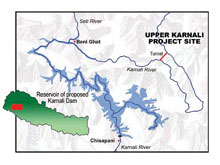 Nature doesn't make hydropower projects more feasible than this. A 140 m drop through a tunnel of just 2.2 km on a bend in the Karnali river in western Nepal. Little submergence, an eight-hour storage for peak power, project site already accessible on the Surkhet-Jumla road. Then there is the price-tag: an incredibly cheap $455 million for a project generating 300MW. There is more: Nepal does not have to pay even one cent, and we get 30 percent equity in the project from a French charity-for free!
Nature doesn't make hydropower projects more feasible than this. A 140 m drop through a tunnel of just 2.2 km on a bend in the Karnali river in western Nepal. Little submergence, an eight-hour storage for peak power, project site already accessible on the Surkhet-Jumla road. Then there is the price-tag: an incredibly cheap $455 million for a project generating 300MW. There is more: Nepal does not have to pay even one cent, and we get 30 percent equity in the project from a French charity-for free! It's all too good to be true. So what's the catch? "We are a trust that supports infrastructure projects in developing countries around the world," says Sylvain Leveque of the Singapore-based French trust, Elysee-Frontiere. "This is a fund for peace, stability and democracy. We chose Nepal because it is trying to develop by making democracy work."
On 22 October Elysee signed a Power Purchase Agreement (PPA) with the Nepal Electricity Authority (NEA) to buy electricity from the Upper Karnali project at a rock bottom cheap Rs 2.90 per kW/h during the dry season and Rs 1.45 during the rainy season. (Compare this to the more than 6 cents per unit the NEA pays to other private producers.)
The agreement is conditional on Elysee coming up with its share of cash by December. If all goes according to plan, this one project will add Nepal's entire present hydropower capacity to the grid by 2008. In addition, the country's neglected far-western hills will get a development boost. Elysee says it is setting aside another $200 million for education, health care and other infrastructure projects in western Nepal.
"The terms of association with Elysee are just too good to ignore," says Devi B Thapa, deputy managing director at the NEA. "We're getting a good PPA and equity in the project, which is what we need to keep tariffs down." The NEA admits it doesn't know the exact details of where the windfall is coming from, but Leveque told us in a phone interview from Singapore that the trust is backed by wealthy investors and runs on earnings from investments in the financial markets. "The idea is to re-invest the profits into viable development projects to raise living standards in poor countries," Leveque told us.
Elysee came in through a fast-track investment committee chaired by Prime Minister, Deuba and did not have to compete with other bidders because it took on a project for which the NEA already had the license. Ex-prime minister Girija Prasad Koirala strongly pushed for the project last year during his tenure.
"If it is a serious party then this is the best thing that could be happening to Nepal," says Bikash Pandey, an energy economist. And that seems to be a big if. The fear is that Elysee came in through the back door, and is going to squat on the license and hand it over to a third party. Leveque flatly denies this, saying his group will meet the December deadline for the financial commitment to obtain its power generation license. "Most of the work has been finalised, it is no problem at all to meet the deadline," he said.
Ratna Sansar Shrestha, a lawyer and Chartered Accountant who was involved with the Khimti project is sceptical. "There are no free lunches these days. There has to be money coming from somewhere for Elysee to give the NEA 30 percent equity," he said. We put this to Leveque, who told us the money is mainly from donors in Europe, Canada and Australia. Come December, we may finally find out if it is all too good to be true.


